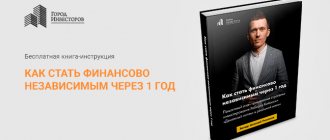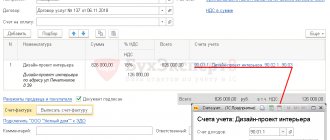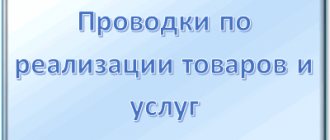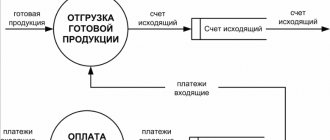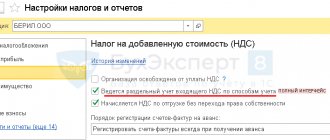When selling goods (works, services), VAT must be paid only if the sale took place in Russia. When selling goods (work, services) outside Russia (on the territory of a foreign state), you do not pay tax. This follows from subparagraph 1 of paragraph 1 of Article 146 of the Tax Code of the Russian Federation.
The rules for determining the place of sale are given in Articles 147 and 148 of the Tax Code of the Russian Federation. The legislation establishes different procedures for determining the place of sale of goods and the place of sale of work (services).
When a company becomes a tax agent
A Russian company becomes a tax agent if:
- the foreign company is not registered in the Russian Federation;
- the service or product you buy is subject to VAT. There are transactions that are not recognized as sales and, therefore, are not subject to VAT (for example, transactions related to the circulation of currency, contributions to the authorized capital of other companies, sale of land, etc.);
- The place of implementation is the Russian Federation.
The tax agent is obliged to withhold VAT from the money paid to the foreign contractor and transfer the tax amount to the budget.
Sales are subject to VAT only in the Russian Federation. If the place of sale of goods (works, services) is the territory of a foreign state, then such transactions in Russia are not subject to VAT.
Customs clearance
Any movement of goods and vehicles across the customs border of the Russian Federation entails the obligation to carry out procedures related to their customs clearance. Moreover, the import of goods and cars into the customs territory of the Russian Federation without the condition of its obligatory export is recognized as import, and, accordingly, the export of goods is recognized as export. In order to import or export goods, it is necessary to comply with established customs procedures related to its direct customs clearance and declaration. Without the skills and knowledge of customs legislation, carrying out such operations presents certain difficulties. Customs clearance and declaration of goods has the right to be carried out by both the declarant and a company that professionally carries out comprehensive customs clearance - a customs broker . In this case, the representative carries out all the necessary formalities on behalf of the declarant or other interested parties, on their instructions.
The stages of customs clearance of goods by the declarant involve the actual presentation of the goods being moved to the customs authority, their declaration and placement under the appropriate regime.
Customs clearance for imports includes comprehensive preparation of the necessary documentation and payment of customs duties, taxes and fees.
When the place of implementation is always the Russian Federation
The place of sale will always be recognized as the territory of the Russian Federation when implementing works (services) provided for in subparagraphs 1 - 4.1, 4.4 of paragraph 1 of Article 148 of the Tax Code of the Russian Federation.
For your convenience, we present the entire list.
1. Works (services) are directly related to real estate. These are construction, installation, construction and installation, repair, restoration work, landscaping work, rental services, etc.
2. Works (services) are directly related to movable property, aircraft, sea vessels and inland navigation vessels located on the territory of the Russian Federation.
These include installation, assembly, processing, processing, repair and maintenance.
3. Services in the field of culture, art, education (training), physical culture, tourism, recreation and sports.
4. The buyer of works (services) is registered in Russia and works in the following areas:
- transfer, provision of patents, licenses, trademarks, copyrights, etc.;
- software development;
- consulting, legal, accounting and auditing services;
- engineering services;
- advertising and marketing;
- information processing services;
- provision of personnel;
- rental of property, except real estate and cars.
If the listed works (services) are purchased by a branch or representative office located in the territory of a foreign state, then Russia is not the place of sale and the subject of VAT does not arise, even if the head office of the company is registered in the Russian Federation.
4.1 Services to a Russian company for the transportation and transportation of goods by road under a transport expedition agreement, when the points of departure and destination are located on the territory of the Russian Federation.
4.2 Services (work) directly related to the transportation and transport of goods placed under the customs procedure of customs transit, if the customer’s place of business is recognized as the territory of the Russian Federation.
4.3 Services of Russian companies for organizing pipeline transportation of natural gas across the territory of the Russian Federation.
4.4 Services of Russian air carriers for the transportation of goods by aircraft from the point of departure to the point of destination located outside the territory of the Russian Federation, if during transportation on the territory of the Russian Federation the aircraft lands and the place of arrival of the goods on the territory of the Russian Federation coincides with the place of departure of the goods from the territory of the Russian Federation.
We emphasize: for the listed works and services, the place of implementation is always recognized as the territory of the Russian Federation.
Sales of goods
As a general rule, goods are considered sold in Russia if at least one of the conditions is met:
- the goods are located in Russia (in territories under its jurisdiction) and are not moved during sale (subclause 1, clause 1, article 147 of the Tax Code of the Russian Federation);
- at the time of shipment and transportation, the goods are in Russia (in the territories under its jurisdiction) (subclause 2, clause 1, article 147 of the Tax Code of the Russian Federation).
An exception to this rule is the determination of the place of sale of hydrocarbons produced in offshore fields. Raw hydrocarbons, as well as products of their processing (for example, stable condensate, liquefied natural gas) are considered sold in Russia if at least one of the following conditions is met:
- the goods are located either on the continental shelf of Russia, or in the exclusive economic zone of Russia, or in the Russian part of the bottom of the Caspian Sea and are not shipped or transported (subclause 1, clause 2, article 147 of the Tax Code of the Russian Federation);
- at the time of the start of shipment and transportation, the goods are located either on the continental shelf of Russia, or in the exclusive economic zone of Russia, or in the Russian part of the bottom of the Caspian Sea (subclause 2, clause 2, article 147 of the Tax Code of the Russian Federation).
Situation: how to determine the moment of shipment of goods when determining the place of their sale for VAT calculation?
Establish the moment of shipment of goods according to the date specified in the first shipping document (in the document confirming the seller’s fulfillment of the obligation to transfer the goods). For example, by date of compilation:
- consignment note in form No. TORG-12, approved by Decree of the State Statistics Committee of Russia dated December 25, 1998 No. 132;
- consignment note in form No. 1-T, approved by Decree of the State Statistics Committee of Russia dated November 28, 1997 No. 78, etc.
This conclusion follows from Article 458 of the Civil Code of the Russian Federation and is confirmed by letters from the Ministry of Finance of Russia dated July 11, 2013 No. 03-07-13/1/26980, dated November 1, 2012 No. 03-07-11/473, dated August 30, 2012 No. 03-07-15/1/20.
If none of the specified conditions are met, then do not pay VAT on the sale of goods. In particular, do not pay tax:
- when selling a building or vehicle located on the territory of a foreign state (letter of the Ministry of Finance of Russia dated September 25, 2012 No. 03-07-08/278);
- when selling goods purchased in one foreign state and transported in transit through Russia to the territory of another foreign state (letters of the Ministry of Finance of Russia dated October 12, 2012 No. 03-07-13/01-49, dated September 25, 2012 No. 03-07 -15/125).
An example of determining the place of sale of goods for calculating VAT. The organization sells the building
JSC Alfa entered into an agreement with LLC Torgovaya for the sale of a building it owned, which is located on the territory of Ukraine.
Both Alpha and Hermes are Russian organizations. The place of concluding the contract for the sale of the building is Moscow.
Since the building is located on the territory of Ukraine, Russia is not considered the place of its sale, regardless of other conditions. Therefore, Alpha’s accountant did not charge VAT on this transaction.
An example of determining the place of sale of goods for calculating VAT. The organization sells goods purchased in one foreign state and transported in transit through Russia to the territory of another foreign state
Torgovaya LLC purchased goods in China for their subsequent resale in Poland. Transportation of the specified goods is carried out in transit through the territory of Russia.
Since the goods are located in China at the time of shipment, Russia is not the place of their sale. Therefore, the Hermes accountant did not charge VAT on this transaction.
The established procedure for determining the place of sale of goods must be applied by both Russian and foreign organizations selling goods in Russia.
Foreign organizations registered with the tax office pay tax on their own. This follows from the provisions of paragraph 1 of Article 143, Article 83, paragraph 7 of Article 174 of the Tax Code of the Russian Federation and paragraph 4 of the Regulations approved by order of the Ministry of Finance of Russia dated September 30, 2010 No. 117n. If they are not registered for tax purposes in Russia, VAT for them is transferred by organizations acting as tax agents:
- when purchasing goods (works, services) from them (clause 2 of article 161 of the Tax Code of the Russian Federation);
- when selling their goods (work, services, property rights) in Russia on the basis of agency agreements, agency or commission agreements (clause 5 of Article 161 of the Tax Code of the Russian Federation).
An example of determining the place of sale of goods for calculating VAT. A foreign organization sells goods in Russia
JSC Alfa purchased a woodworking machine from a Polish organization that does not have permanent representative offices in Russia. The machine is shipped from a Moscow warehouse, to which it was previously imported by a Polish organization for storage. Since at the beginning of shipment the machine is located in Russia, this operation is subject to VAT.
Since the Polish organization is not registered with the tax office, when collaborating with it, Alpha acts as a tax agent for VAT.
In June, Alpha transferred funds to the Polish organization for the purchase of the machine. The Alpha accountant transferred the tax amount to the budget.
Situation: is it necessary to charge VAT on the sale of goods that are shipped in transit from the warehouse of a foreign supplier? A Russian organization purchases goods abroad, clears them through customs and sells them on the domestic market. Ownership of the goods passes to the Russian buyer on the date of customs clearance.
Yes need.
In the situation under consideration, a Russian organization carries out two operations, each of which is an independent object of taxation.
The first is the importation of imported goods into Russia, the owner of which has become a Russian organization abroad (subclause 4, clause 1, article 146 of the Tax Code of the Russian Federation). During this operation:
- goods undergo customs clearance in accordance with the procedure for release for domestic consumption (Article 209 of the Customs Code of the Customs Union);
- The importing organization pays VAT at customs (subclause 1, clause 1, article 151 of the Tax Code of the Russian Federation) and claims this amount for deduction (clause 2, article 171 of the Tax Code of the Russian Federation).
The second operation is the sale of goods to a Russian buyer. Such an operation is subject to VAT if the goods were on the territory of Russia at the time of the start of shipment and transportation (subclause 2, clause 1, article 147 of the Tax Code of the Russian Federation). When applying this rule, keep in mind that in this case, the start of shipment (transportation) of goods to the Russian buyer is not the date of their removal from the foreign supplier’s warehouse, but the date of transfer stipulated by the contract. After all, from the moment the goods are shipped from a foreign warehouse until the moment of customs clearance, the importer remains their owner. The importer can transfer these goods to the buyer only after customs clearance. That is, after the goods were actually imported into Russia. And since the transfer of goods to a Russian buyer takes place on the territory of Russia, then VAT must be charged (subclause 1, clause 1, article 146 of the Tax Code of the Russian Federation). It does not matter that the goods are shipped to the buyer in transit from abroad, bypassing the importer’s warehouse - the method of delivery in this case does not matter.
The same procedure applies if a Russian organization imports goods from countries participating in the Customs Union. The only difference: since there are no customs borders between the member countries of the Customs Union, when importing goods, the Russian importer pays VAT not at customs, but through the tax office (clause 4 of article 72 of the treaty on the Eurasian Economic Union, clause 13 of appendix 18 to the treaty on Eurasian Economic Union).
Government Decree No. 102
This Resolution requires participants to provide a CT-1 certificate, as well as a declaration of the country of origin in parts 1 and 2 of the application.
If at least 2 suppliers with Russian goods from different manufacturers take part in such a purchase, then Order 126n applies to the purchase.
If a participant does not provide ST-1, then his goods are automatically considered as foreign.
This resolution on the ban and restriction of foreign goods does not apply if the purchase takes place within the framework of state programs (they are listed in the resolution itself).
Order of the Ministry of Finance 126n - changes from October 1, 2021! Priority for goods of Russian origin
The Ministry of Finance made changes to order 126n.
Now the order has two applications. From the old Appendix, which is now number 1, 10 positions were excluded, several more were replaced, and more than 30 new ones were added. The new Appendix No. 2 includes more than 40 OKPD 2 codes.
For products from Appendix 1, the preference on the contract price remains 15% .
For goods from the Second Appendix that are purchased as part of national projects, the price advantage will be 20%.
For bidding in the form of a competition, request for quotations, request for proposals: if the product is Russian-made, then when evaluating submitted applications, the price indicated by the participant will be considered as if it were 15% (20%) lower (for example, the participant indicated the price in the application 100 000 rubles, during consideration and evaluation will be taken into account as if he submitted a price of 85,000 rubles (80,000 rubles).In this case, the contract will be concluded with the winner at the price specified by him in the application (in our example, this is 100,000 rubles).
For procurement in the form of an auction: applications are considered at the price that participants indicated in their application. BUT! If a participant who offers at least 1 foreign product wins, then the contract with him is concluded at 15% (20%) lower than the price he offered (for example, such a participant offered a contract price of 100,000 rubles and won the auction, but if he offers a foreign product for delivery goods, then the contract with it is concluded for 85,000 (80,000) rubles).
When participating in an auction, it is necessary to declare the country of origin of the goods in parts 1 and 2 of the application!
Priority for goods of Russian origin does not apply if:
- the purchase did not take place
- All participants have the country of origin of the goods in Russia
- all participants have foreign goods
Restrictions on the purchase of medical products
Limit the supply of foreign medical products when purchasing products from lists No. 1 and 2, approved by RF Government No. 102 of 02/05/2015. The rules for using supporting documents depend on the type and group of products purchased.
Restrictions are not established when ordering medical products sold for border cooperation programs (clause 5 of PP No. 102). To conduct such a public procurement, a conclusion must be drawn up in the Ministry of Industry and Trade.
The restrictions work like this:
- It is impossible to purchase goods from list No. 1 and products not included in it within one purchase.
- Confirmation of the country of manufacture is the ST-1 certificate.
- Applications containing proposals for foreign medical devices are rejected subject to the “third wheel” rule (if there are two qualifying applications). If you have not rejected offers with foreign products, apply the admission conditions (clause 2 of PP No. 102, clause 1 of order 126n).
- The execution of the government contract takes place without replacing the supplied products with foreign ones.
Single-use medical products are purchased in a similar way, but with some nuances:
- NMCC, unit price of goods, the initial price amount and the maximum value of the state contract price are calculated according to the methodology enshrined in the order of the Ministry of Health No. 759, the Ministry of Industry and Trade No. 3450 dated 10/04/2017;
- all prices are justified by the customer;
- the purchase includes only products from list No. 2 of PP No. 102;
- the country of origin is confirmed by the ST-1 certificate;
- the share of foreign raw materials in the cost of products is recorded in the examination report of the RF Chamber of Commerce and Industry or another document from an authorized organization from the EAEU;
- foreign proposals are rejected if there are at least two applications that meet the compliance requirements;
- when determining compliance, the percentage of foreign raw materials in the price is taken into account (RF PP No. 967 dated August 14, 2017) and the availability of documents in accordance with GOST ISO 13485-2017;
- admission conditions apply to transcriptions with foreign products from list 126n that were not rejected by the customer;
- the contract is implemented without replacement of goods and the manufacturer of medical devices.
List No. 2 contains additional requirements. When ordering medical products to meet the needs of some federal and state budgetary institutions, the conditions from paragraphs. “a”, “b” clause 1 of PP No. 967 and clause 2 of RF PP No. 1589 dated 12/19/2018. Such additional requirements include the obligation to select a supplier from among manufacturers of products from list No. 2 who localize their own production, and manufacturers whose localization indicator of their own production corresponds to the annual achievement of the value established in Government Resolution No. 967.
A draft resolution was published on the website of draft regulations. We are waiting for new restrictions for foreigners:
- bare metal stents for coronary arteries;
- drug-eluting stents for coronary arteries (including those with non-absorbable polymer coating and those with absorbable polymer coating);
- standard balloon catheters for coronary angioplasty;
- aspiration catheters for embolectomy (thrombectomy).
It is planned that the restrictions will be in force for 2 years and will create technological and economic advantages for Russia.
Restrictions will be applied according to the “second odd one out” rule: if at least one application is submitted with a proposal to supply domestic products, then foreign ones will be rejected. The country of origin of the goods will be confirmed either by the ST-1 certificate or by the conclusions of the Chamber of Commerce and Industry.
Along with the draft resolution, an annex to it was also developed. It approved a list of universal technological operations that are carried out by manufacturers of stents for coronary arteries and catheters in the Russian Federation. And confirmation of compliance of the production of stents for coronary arteries and catheters with the requirements set out in the list is an examination certificate of the Chamber of Commerce and Industry. The issuance procedure will be determined after agreement with the Ministry of Industry and Trade.
| on restrictions for foreign stents and catheters |
Government Decree No. 617
Limits the admission of foreign goods, namely: the customer must reject all applications with foreign goods if at least 2 applications are submitted, where all goods are produced in the Russian Federation or countries of the Eurasian Union from different manufacturers.
If the proposed product is manufactured in the Russian Federation, then it is necessary to provide the registration number of the product from the register of industrial products.
If the product was produced in a country that is part of the Eurasian Union, then the participant must provide an CT-1 certificate.
If the supplier does not provide a number from the register of industrial products or does not provide ST-1, and also if the goods are foreign, then the restriction on foreign goods in accordance with Ministry of Finance Order 126n is applied to such participants (if the applications were not rejected).
Provision of services by a customs broker
Specializing in the field of customs law and consulting, a customs broker will help carry out all the necessary operations to carry out all the necessary procedures and declare goods within the framework of the contract as efficiently as possible, at the lowest cost and in the shortest possible time. Thus, the services of a customs broker represent customs operations carried out by him on behalf of and on behalf of the customer (declarant) on a contractual basis. Experts in their field will help you competently organize the entire process of interaction with regulatory authorities and correctly and quickly prepare the necessary documentation for imported goods. In addition, professional representatives will help you get rid of unnecessary routine, presenting the freed up time to more important matters.
The cost of customs clearance of goods and services of a customs broker can be determined either as a percentage of the customs value of goods, or as a fixed amount for customs clearance of a certain batch of goods. It should be noted that the customs broker does not have the right to refuse the customer to conclude an agreement and carry out all the necessary operations; refusal is possible only on the condition that he does not have the opportunity to provide such a service or work. Therefore, the customs services provided by them are mandatory. The efficiency of foreign economic transactions is directly dependent on the speed and quality of customs clearance of goods. Being a professional in the field of customs, a customs broker will carry out all customs formalities with the best benefit-cost ratio within the framework of the customs services he provides. When choosing a declarant, preference should be given to an integrated approach to conducting foreign trade transactions, in terms of the customs services they provide. Undoubtedly, the most convenient form of cooperation is a single supplier of the entire range of operations provided when implementing an international contract, including transport logistics, legal registration of foreign trade transactions and customs clearance of cargo. Such a company must have capabilities in international logistics, transportation of all types of cargo and be a professional in the field of consulting for foreign economic activity (customs clearance, delivery, legal support). A company carrying out economic activities in foreign markets needs delivery and clearance of goods within a given time frame. Cargo transported across the Russian border is subject to taxes and duties; such movement is accompanied by filling out a large number of various documentation. To complete all formalities at customs, an appropriate license and the organization’s attachment to the customs terminal are required. All procedures are quite complex and entail significant risks, such as failure to meet delivery deadlines and liability. Therefore, transferring all these functions to professionals is more than reasonable. When assessing the list of customs services provided, one should take into account its ability to perform customs operations of any complexity at the customs offices required by the customer in Moscow, St. Petersburg and any other customs points in Russia. The presented site is an information resource about the activities of customs brokers and we do not provide customs services.
Tax advice is provided by experts from the Tax Planning website; support for the consulting section regarding documentation and accounting of import and export transactions is provided by specialists from the Accounting Services in Moscow website as part of the affiliate program.
How to obtain permission for government procurement of foreign manufactured goods
On June 30, 2021, Order No. 1755 of the Ministry of Industry and Trade dated May 29, 2020 on approving the procedure for issuing permits for the purchase of foreign manufactured goods came into force. Such permission is issued on the basis of an application. We made a review with answers to the main questions.
| Who applies for a permit? | Applicants will be:
The applicant customer will have to select a representative to submit and sign the application. |
| How to apply | The application will be submitted electronically through your personal account on the website of the State Industry Information System (GISP). The application is filled out and signed with an enhanced qualified electronic signature of the representative. It and the documents that accompany it must be unclassified. If there are several goods, then the application and documents for it are submitted for each separately. All stages of the application evaluation will be reflected in the GISP personal account and via email. |
| What to include in your application | Clause 3 of the draft procedure contains a list of information that must be contained in the application. The following information will be provided:
|
| How will your application be verified? | The application is subject to stage-by-stage verification. First of all, they will consider its completeness and correctness. The responsible department of the Ministry of Industry and Trade will have 5 working days from the date the application was received. If deficiencies are identified, the application will be sent for revision for resubmission and review. Once the application is found eligible, it will be sent for comparative analysis. GISP will automatically compare the declared goods with similar goods from the registers of Russian and Eurasian products. |
| Deadlines for obtaining permission | If similar products are not in the registers, then within 5 working days the government customer will be issued a permit. If a product is found in the registers, the GISP will automatically send a request to manufacturers of a similar product about the possibility of creating it. Within 10 working days from the date the request is received, the manufacturer at the GISP will confirm or deny this possibility. If information has not been received from him, the creation of an analogue has not been confirmed. Within 5 working days after receiving information from the manufacturer, the customer will receive:
The customer will have the opportunity to challenge the decision. |
| What features will have to be taken into account when purchasing? | The validity period of the permit is 18 months from the date of its issue. And it will only be used for one purchase. Within 10 working days after concluding the contract, customers will report on the results of the purchase of goods in their GISP personal account. |
Since May 1, 2020, a large-scale reform of the national regime has begun. Read more about it: “Import substitution in action, or How not to violate the rules of the national regime.”
Examples
Here are a few examples of when you need to pay VAT when providing services to a foreign company, and when you don’t have to.
We pay VAT
A foreign food manufacturer decided to open production on Russian territory.
He ordered services for the design, construction and installation work of his plant from a Russian contractor. Russia will be recognized as the place of sale of services, since they involve real estate transactions. A Russian construction company will have to transfer VAT to the budget on the profit received during the construction of the plant. Another example. A foreign manufacturer ordered a service from a Russian engineering company to train its personnel to work on a production line. Since educational services are provided on the territory of Russia, the place of their provision is the Russian Federation.
Not only the state, but also an individual has the right to lease agricultural land. What is a state housing certificate, why is it needed and how to get it? You will find the answer to all these questions in our article.
Are you planning to buy an apartment in the Krasnodar region? All important details are described in the material.
Banned software
The government has established a ban on the purchase of foreign software. The Ministry of Telecom and Mass Communications maintains a unified register of Russian programs and Eurasian software for electronic computers and databases. If the customer plans to purchase software and this register contains information about Russian and Eurasian programs that, in terms of functional characteristics, fully comply with the customer’s requirements, it is prohibited to purchase foreign analogues.
The supporting document is the supplier's declaration. The current unified register of Russian computer programs and databases is posted on the official website of the Ministry of Communications.
| Normative act | RF PP No. 1236 dated November 16, 2015. |
| When to use | In any competitive procedures and in procurement from a single supplier. Exception: the customer prepared and included in the documentation a justification for the impossibility of complying with the prohibition. |
| How to use | It is prohibited to purchase foreign products. |
| What is included with the application for participation? | Nothing. The origin of the software is confirmed by information from the Russian software register or the EAEU software register. |
| Is it possible to include in the purchase both goods not from the legal acts and from the legal regulations? | Not prohibited, but not recommended. When combining, be prepared to confirm the technological and functional relationship. |
